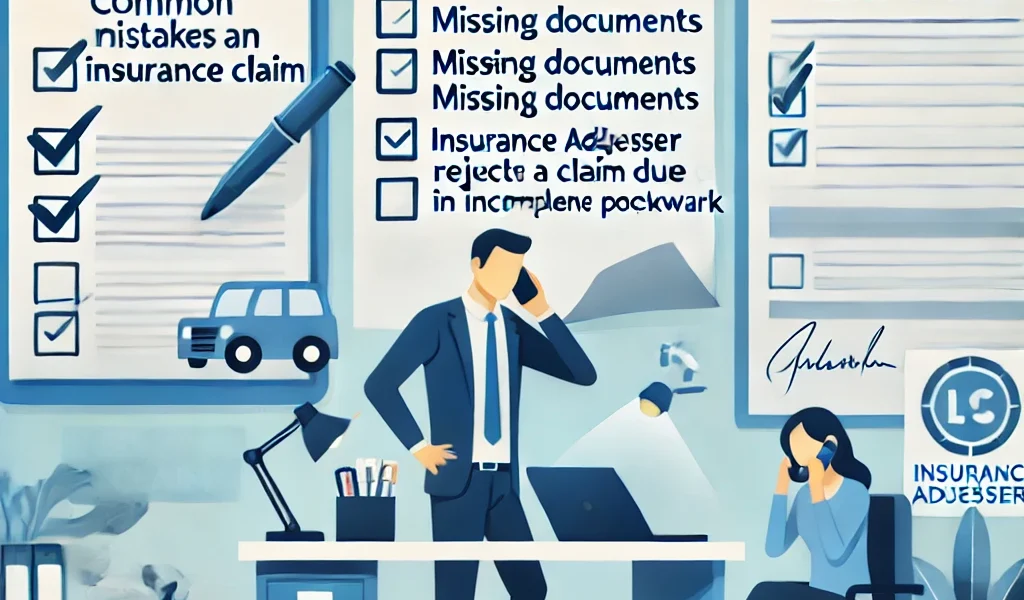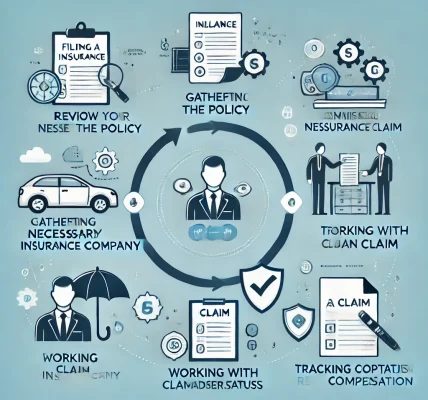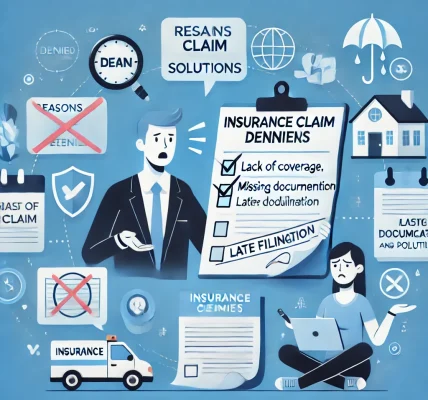Filing an insurance claim might seem like a straightforward process, but even small mistakes can lead to delays, denials, or reduced settlements. Whether you are dealing with health, auto, home, or business insurance, understanding the common pitfalls can help you avoid unnecessary stress and financial losses.
This DIY guide will walk you through the most common mistakes people make when filing insurance claims and provide expert tips to ensure a smooth and successful claims process.
1. Not Understanding Your Policy Coverage
One of the biggest mistakes claimants make is not thoroughly understanding their insurance policy before filing a claim. Every policy comes with:
- Coverage limits
- Deductibles
- Exclusions
- Claim filing deadlines
How to Avoid This Mistake:
- Read your policy carefully before an incident occurs.
- Contact your insurer or agent if you have any doubts about what is covered.
- Keep a digital or physical copy of your policy for easy reference.
2. Delaying the Claim Filing Process
Most insurance companies require claims to be reported within a specific timeframe after an incident. Delays in reporting can lead to claim rejection or difficulties in proving your case.
How to Avoid This Mistake:
- Notify your insurer as soon as possible after an accident, damage, or loss.
- If you cannot report the claim immediately, document the incident with photos and notes.
- Keep records of all communications with your insurer.
3. Providing Incomplete or Inaccurate Information
Incorrect or missing information can lead to claim denials. Even minor discrepancies in your claim form can raise red flags for insurers.
How to Avoid This Mistake:
- Double-check all details before submitting your claim.
- Provide accurate personal details, incident descriptions, and documentation.
- If unsure about certain details, consult with your insurance provider before submitting.
4. Not Documenting the Damage or Loss Properly
Lack of evidence can make it difficult for insurance companies to process your claim. Without proper documentation, insurers may question the legitimacy of your claim.
How to Avoid This Mistake:
- Take clear photographs and videos of the damage or injury.
- Keep copies of medical reports, repair estimates, police reports, and receipts.
- Collect witness statements if applicable.
5. Admitting Fault Too Soon
In cases of auto accidents, liability claims, or property damage, admitting fault too soon can be a major mistake. Even if you think you are responsible, the insurance investigation may reveal otherwise.
How to Avoid This Mistake:
- Do not admit fault to the other party, police, or insurance company until a full investigation is completed.
- Stick to facts only when describing the incident.
- Let the insurance adjuster and legal professionals determine liability.
6. Accepting the First Settlement Offer Without Reviewing
Insurance companies often offer an initial settlement that may not fully cover your expenses or losses.
How to Avoid This Mistake:
- Review the settlement offer carefully before accepting.
- Compare the payout with repair estimates or medical expenses.
- Negotiate if the offer seems too low and provide supporting documentation.
7. Failing to Keep Communication Records
Many claimants do not track their conversations with insurers, which can lead to miscommunication and delays.
How to Avoid This Mistake:
- Keep a written record of all phone calls and emails with your insurance provider.
- Note down names, dates, and details of conversations.
- If possible, communicate via email for documentation purposes.
8. Not Cooperating with the Insurance Adjuster
Insurance companies may assign an adjuster to assess your claim. Failure to cooperate with them can result in claim delays or denials.
How to Avoid This Mistake:
- Be polite and cooperative with the adjuster.
- Provide requested documents and access to inspect damages.
- Do not exaggerate or falsify damages, as this can lead to fraud accusations.
9. Overlooking Policy Exclusions
Every insurance policy has exclusions—specific situations or damages that are not covered. Many people assume that everything is covered, leading to unexpected claim denials.
How to Avoid This Mistake:
- Review your policy exclusions before filing a claim.
- Ask your insurance provider for clarification if needed.
- Consider additional coverage if necessary (e.g., flood insurance for homeowners).
10. Not Appealing a Denied Claim
A denied claim does not necessarily mean the end of the road. Many people accept rejections without challenging them.
How to Avoid This Mistake:
- Read the denial letter carefully to understand the reasons.
- Gather additional evidence if needed and request reconsideration.
- If necessary, seek help from a lawyer or insurance expert.
11. Filing Too Many Small Claims
Repeatedly filing small claims can increase your premiums or even lead to policy cancellation.
How to Avoid This Mistake:
- Consider paying for minor damages out of pocket if they are less than your deductible.
- Reserve insurance claims for significant losses that exceed your deductible.
12. Assuming Your Insurer Will Handle Everything
Many policyholders believe their insurance company will manage everything for them. However, insurance companies aim to minimize payouts.
How to Avoid This Mistake:
- Stay involved in the claim process.
- Ask questions if something seems unclear.
- Consider consulting an independent insurance expert for complex claims.
Frequently Asked Questions (FAQs)
Q1. How long does it take for an insurance claim to be processed?
It depends on the insurer and claim complexity. Some claims are settled in a few days, while others take weeks or months.
Q2. What should I do if my insurance company is delaying my claim?
Follow up regularly, escalate the issue to a supervisor, and seek legal advice if delays are unreasonable.
Q3. Can I negotiate my insurance claim settlement?
Yes! If the initial offer is too low, provide additional documentation and negotiate.
Q4. Does filing an insurance claim increase my premiums?
It depends on the claim type and frequency. Frequent claims may lead to higher premiums.
Q5. Can I file an insurance claim without a police report?
It depends on the claim type. Some claims, like auto accidents or theft, require a police report, while others may not.
Final Thoughts
Avoiding these common mistakes can save you time, stress, and money when filing an insurance claim. Understanding your policy, documenting everything properly, and communicating effectively with your insurer will improve your chances of a smooth claim process.




